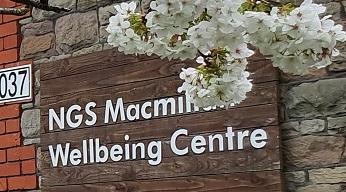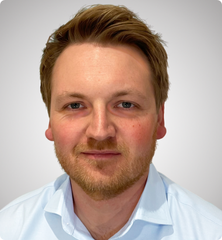Preparation for your short stay knee replacement
This booklet has been written by the teams who will look after you during surgery. It aims to help you understand the surgery, guide you through the various phases of your operation, and inform you how you can best prepare and recover afterwards.
You may be given a paper copy of this information which you should bring with you on the day of your surgery.
This page contains the following information:
- Preparing for your operation
- On the day of your operation
- Going home
- Physiotherapy advice
- Therapy advic
A joint replacement operation is done to improve your quality of life. It will hopefully allow you to do some of the things that have become difficult with your joint arthritis.
From the day you are admitted to hospital, the staff involved in your care will work together to assess your needs in preparation for leaving hospital.
We ask you to provide us with all the necessary information that will help with planning your hospital care and timely discharge, as early as possible.
You will need to make the arrangements for your own transport home prior to your admission. If you or your relatives/carers have any concerns about your hospital discharge or transfer, do not hesitate to ask a member of the team.
Discharge Lounge
Where possible, discharge arrangements will be made so you are able to vacate your hospital bed. This may include transfer to the Discharge Lounge; we will prepare you and keep you informed.
The Discharge Lounge is a safe area providing nursing care and regular refreshments and meals, including breakfast, where you can wait to be taken home.
Pathway for recovery
Returning home as soon as safely possible, even on the same day as your operation
As a result of expert surgery, anaesthetics, and a highly skilled team of doctors, nurses, and allied health professionals, many patients will not need to stay in hospital overnight and will be ready to go home the same day.
This is the usual pathway in many orthopaedic centres across the country, providing an excellent standard of care with very positive results and patient feedback.
However, some patients may not be ready to return safely home the same day and will need a little longer. If this is the case, we would expect you to be able to go home the day after your surgery, or as soon as all teams treating you are satisfied.
We will only discharge you once you are recovered and able to safely return home.
Managing and understanding the process
It is important for you to have realistic expectations of having joint replacement surgery. You should have a clear understanding of what to expect at each stage. You must prepare appropriately for your surgery and work with the clinical teams you meet during your care.
Preparing for your operation
Prepare ahead
The weeks leading up to your operation are as important as the operation day itself.
After your surgery, you will either return home on the same day, or stay in hospital for just one night. You should plan ahead before your surgery and think about how things might be for you when you return home. You must also attend all your appointments before your surgery date.
Arranging transport
You should arrange for a family member or a friend to collect you after your surgery. The hospital does not routinely provide transport for your return home.
Assistance for after your surgery
You have probably been living with joint pain for some time before your operation and will already have ways of adapting to certain situations at home. However, when you are recovering from your operation you may also need some extra help with general tasks at first, like cooking, shopping, and cleaning. You must organise this help before your operation date.
To make sure that your return home is successful and safe, you will need to have someone to stay with you overnight after your discharge, and for a few days after returning home. This is essential if you are to go home on the day of surgery.
Care agency support
Very few people need professional care support at home. The NHS can only provide professional care based on specifically assessed needs and cannot arrange convalescent care. If you choose to have help, not based on assessed need, you must arrange this privately.
Prepare your home
Preparing your home environment in advance is really helpful for when you get discharged.
For example, you can:
- Freeze some simple to cook meals or have some ‘ready meals’ on hand.
- Move any regularly used items that are heavy, or out of reach, to more accessible places, such as moving the saucepans you use frequently up from any low shelves or cupboards.
- Avoid potential trip hazards by removing any loose rugs or obstacles from the floor such as excess furniture or things that would be easy to trip over.
- Make arrangements for someone to care for any pets, including walking dogs, after your surgery.
Keep fit and healthy
The fitter you are before your operation, the less likely you are to have complications during and after your surgery.
You should seek to make some lifestyle improvements, such as:
- Reducing alcohol intake.
- Stopping smoking.
- Keeping as mobile as possible and exercising.
- Losing weight.
You should aim to control any long-term health conditions as well as possible before your operation to help prevent any complications, and to avoid your operation being postponed.
Check your own blood pressure if you are able to or get it checked at your GP. If it is above 160/90 you are likely to require medication and the sooner this is started, the sooner we will be able to go ahead with your surgery.
Similarly, if you have diabetes and your HbA1c has not been checked for 6 months or was over 69mmol/mol the last time it was checked, please arrange to have this checked again, and work with your diabetic adviser to improve it.
It is very unlikely that your surgery will be done if your diabetes is not well controlled and your HbA1c is above this value.
The pre-operative assessment process is important as it helps the hospital plan your care.
You will be asked by the hospital to provide some information about your general health and current medications. You may be asked to provide this information via:
- Computer or mobile app.
- Phone consultation.
- Video consultation.
- Face-to-face appointment.
This allows us to inform and advise you about your procedure, for example, we can provide you with instructions about medications and fasting times before your operation.
What details will be checked?
At your pre-operative assessment appointments we will check various medical details such as:
- Your general health status.
- Your blood pressure.
- Your blood count to see if you are anaemic.
- Your kidney functions.
- How well you are controlling your diabetes.
Medicines
We will also review your medicines. It is fine to continue taking most medicines and to take them on the day of your surgery. However, there are certain medications we may need you to stop taking for a few days before your operation, such as:
- Blood thinning/anti-clotting medications.
- Some blood pressure medications.
We will give you clear instructions if this is needed and tell you when you should start these medications again after your surgery.
Ward staff will inform you of the pain relief that your surgical team have prescribed for you when you leave hospital. This discussion will also include advice about paracetamol. We advise patients to source their own supply if they are able to do so, in line with North Bristol NHS Trust Policy.
Do your physiotherapy exercises
The exercises on page 18 of this booklet should be completed both before and after your surgery. Doing these exercises before your operation will strengthen your muscles and will help you to recover more quickly after surgery.
On the day of your operation
You will be given a specific time to arrive, depending on the time of your operation.
Eating and drinking before your operation
You must follow the instructions about fasting times. It is important that you follow the fasting instructions correctly or your operation may be cancelled on the day. You must not have any food or milky drinks for 6 hours before your surgery. Please do not suck sweets or chew any sort of gum.
We encourage you to continue to drink plain water until you arrive at hospital and after your admission this will be provided according to your anaesthetist’s instructions.
What to bring with you to the hospital
- All your current medication in original packaging.
- Wear loose, comfortable day clothes to get dressed back into after your operation. Your leg may be swollen after surgery so make sure this is an appropriate size.
- Flat, sturdy footwear with a back on it. No mules or sliders.
- Overnight bag in case you are not ready to return home on the same day.
- Glasses, hearing aids, walking aids that you might have.
- Phone, charger, headphones, music devices, if you would like to listen to music during your operation.
- It is also a good idea to bring something to read to keep you occupied in case you have a wait. Wi-Fi coverage can be variable.
- Contact details of the person who will be picking you up.
- Any letters you receive from the hospital giving you arrival instructions for the day of surgery.
Please try to avoid bringing in a large number of items with you and minimise items of high value or cash.
Arriving at the hospital
When you arrive, you will be greeted by a member of the reception team. They will book you in and confirm some details with you. You will then be seen by one of the nursing team who will run through some additional questions.
Confirming your consent form
The surgical team will confirm with you the operation they are planning to do and check your consent form. They will use a pen to draw an arrow on the leg that is going to be operated on.
They will be able to answer any last-minute questions you may have.
Meeting your anaesthetist
Before your operation, you will meet your anaesthetist. They will explain the type of anaesthetic that is going to be used and answer any questions you may have about the anaesthetic.
Getting ready for your operation
When it is time for your operation, you will be asked to change into a theatre gown. You will then walk to the operating theatre with one of the team. There, you will be greeted by your anaesthetist, and you will also meet the operating department practitioner, who works with the anaesthetist to look after you.
Routine checks
Some routine checks will be carried out to confirm your identity and to check if you have any allergies. We will confirm again your operation, and what side you are having it on.
Attaching monitoring equipment and a drip
One of the team will attach some standard equipment to monitor your heart, blood pressure, and oxygen levels while you are having your anaesthetic and operation.
Your anaesthetist will also be giving you various medicines through a drip in the back of one of your hands. These include antibiotics, anti-sickness medicines, and fluids.
Spinal anaesthetic
In some cases, your anaesthetist will give you a spinal anaesthetic. This is very safe, and avoids the need for having a general anaesthetic, which may cause unpleasant side effects.
Spinal anaesthetic also helps you to recover quickly and receive the best post-operative pain relief.
Local anaesthetic is placed around some of the nerves in your lower back. This numbs your pain nerves so that you do not feel pain during the operation.
The operation
Once you are in the operating theatre, your leg will be painted with some cleaning fluid and then covered with drapes. You will not be able to see the surgery and the local anaesthetic block will prevent you from feeling any of the operation.
Some people find listening to music through their headphones to be a good distraction. It helps them to relax, and this will be offered to you. You may wish to bring your own music on your phone or portable music device, and your own headphones.
Some people prefer to have a small amount of sedation so that they have a light sleep through their surgery. Your anaesthetist will discuss and agree with you a plan depending on your medical history, and your wishes.
The operation typically takes about 1.5 hours. During this time, your observations will be continually monitored by your anaesthetist.
After the operation
At the end of your operation, you will be transferred to the recovery area where the nurses will monitor your observations. You will be encouraged to eat and drink.
Once your anaesthetic has mostly worn off, you will be assessed by our nursing and therapy teams. They will help you get up, stand, and practice walking with walking aids. The team will practice with you getting on and off the bed, chair, and toilet. You will be encouraged to get dressed in home “day clothes” with supportive footwear (no mules or sliders). You will also be taught how to safely use the stairs.
To return home, the team needs to be happy that you can manage these activities at home with walking aids if required. If you require any equipment to assist you, this will be assessed and provided before your discharge. Please bear this in mind when organising your transport home.
Going home after your operation
Returning home
Everyone reaches their post-operative goals at different times. This determines whether it is safe for us to let you go home on the same day as your operation, or if you need to stay overnight with us at the hospital.
Arrange for someone to collect you
When you have been cleared for discharge, you can contact your family or friends to come and collect you from the hospital.
Arrange for support at home
If you live alone you will need to arrange for a friend or relative to stay with you overnight after discharge and for a few days after returning home. You should arrange this before you come in to have your surgery.
Wound dressing
Your wound is covered by a shower proof dressing so you can shower as soon as you feel able but do not aim water directly at the dressing. You will be seen by a healthcare professional two weeks after your operation to have your wound checked. Please leave any dressings in place and keep as dry as possible until this appointment. Seek advice if the dressing is wet or peeling off the wound.
Keep active after your operation
The sooner you can get up and walk after your operation, the better and faster your recovery will be. You will also have a lower risk of complications after your surgery. Keeping still after your operation tends to result in your leg swelling, which ends up making it even more painful to walk. This can cause more side effects, which requires more pain relief, resulting in a vicious circle.
Pain control
Joint replacement surgery is painful – just like any other surgery. The first few weeks can be a difficult period. However, it is important to stay active and keep up with your movement exercises. We will be giving you strong pain relief medication. However, you should expect there to still be mild to moderate pain when moving. It is not going to be 100% pain free.
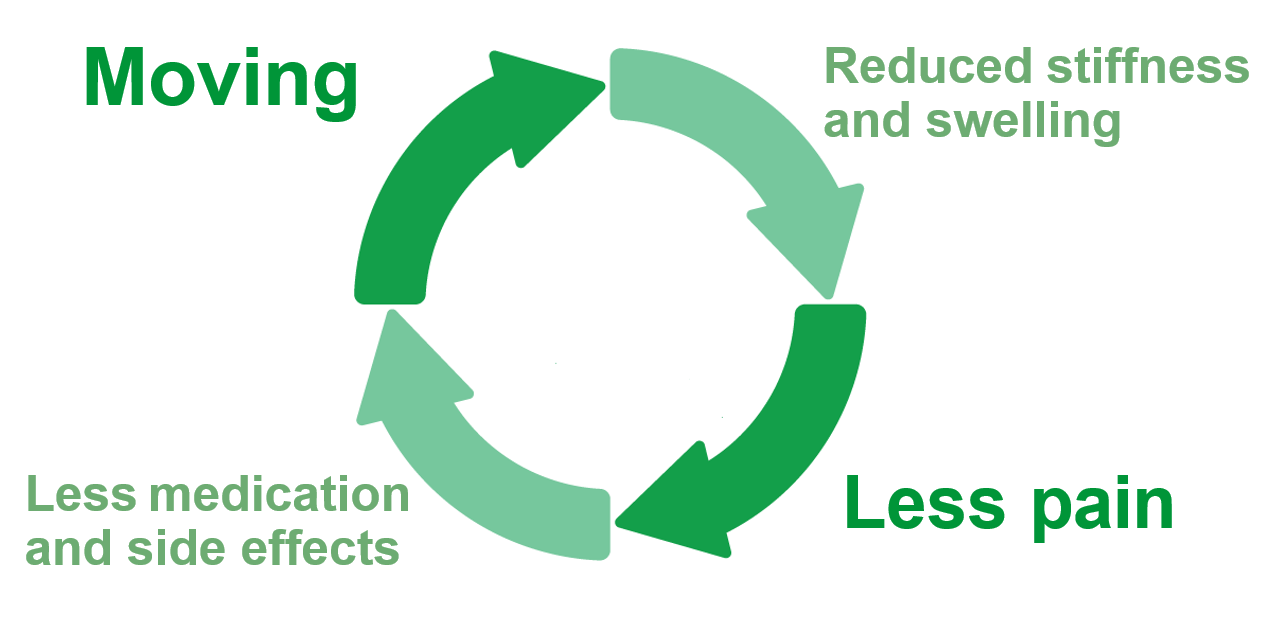
The pain relief package you receive has been specially designed to try and control your pain as well as possible. It starts from the day of your surgery and continues after your discharge home. We will give you the same pain relief tablets whether you stay in hospital overnight or return home on the same day as your operation.
The pain relief package requires you to take your medicines at specific times.
Ward staff will inform you of the pain relief that your surgical team have prescribed for you, when leaving hospital. This discussion will also include advice regarding paracetamol, where we advise patients to source their own supplies if they are able to do so, in line with North Bristol NHS Trust Policy.
Additional medications
We will ask you to take additional medications to help minimise side effects, such as nausea or constipation. Other medications will be given to reduce the chance of certain complications, such as blood clots after your operation. You will be given clear information about the medicines you are sent home with, and when to take the doses.
What to expect when you get home:
Swelling: it is common to have some generalised swelling of the leg. Swelling will often get worse if you sit for a long time, so we encourage you to remain gently active. To help reduce lower limb swelling you may need to rest for at least 20 minutes in the morning and/or afternoon on the bed initially. If you have increasing swelling and pain, please seek medical advice.
Constipation is usually due to the pain relief medication you are taking. We will give you some laxative medication as part of the routine pain relief package. However, please make sure you take these as prescribed, along with drinking plenty of water. Keeping mobile will also help reduce symptoms. If you struggle, then please discuss this with your GP.
Pain is the biggest issue. It is something you should expect after your operation, but it is key that you do not stop doing your exercises. In the first couple of weeks it is vital to balance ice treatment with pain management and careful limited physiotherapy. Please make sure that you follow the pain management program you were discharged with to help control your pain.
Ice therapy can be very helpful in reducing swelling and pain after your operation. If you are given an ice band please make sure you take it home with you. If not, you can use a bag of frozen peas or similar at home. An ice band can be applied but if using frozen peas etc, wrap them in a damp tea towel/ pillowcase before applying to your leg.
Ice therapy can be used for up to 20 minutes. You should leave at least one hour after each ice therapy application to give your circulation time to recover. Make sure your wound dressing does not become wet.
If you have any of these conditions you should discuss this with your Physiotherapist before using any ice therapy:
- Problems with your circulation.
- Fragile skin.
- Loss of skin sensation.
Difficulty sleeping: it is common for people to experience some disturbance in their normal sleep pattern in the first few weeks after an operation. Please do not worry as this usually improves with time. You can sleep in any position including lying on either side.
What to look out for
Deep vein thrombosis (or DVT) blood clots in the leg can happen after joint replacement surgery. If your leg becomes hard, swollen, hot, and painful, especially in the calf area then this could be a sign of a blood clot. Please seek medical advice if you get these symptoms.
Infection is very rare. However, if your joint replacement or scar becomes hot, red and/or increasingly swollen, or if you feel unwell, then please seek medical assistance.
Support after discharge
The ward team will let you know what arrangements have been made for your follow-up appointments.
Following your discharge from hospital there is always someone you can contact for advice
If you would like more information before your operation or have any questions after you have been discharged home, or concerns about your wound, contact your Consultant’s Secretary in the first instance unless you have been given an alternative contact such as a Specialist Nurse/Practitioner.
For therapy related queries, please contact Physiotherapy admin 0117 414 4412 or Occupational Therapy admin 0117 414 1272.
Physiotherapy advice
Completing the exercises below will benefit your recovery, improve movement in the knee joint and develop the strength of muscles around it.
These exercises should be completed before and after your surgery. Doing these exercises before your operation will benefit your recovery. We recommend you continue these exercises for a minimum of 6 weeks after surgery. Complete your exercises 3 to 4 times a day, repeating each exercise up to 10 times.
Total knee replacement exercises
Ankle pumps
Lying on your back, quickly point your toes up and down 10 times.
Repeat every hour you are awake.
This exercise improves the circulation in the lower limbs, helps to prevent the formation of deep vein thrombosis (blood clots), and reduces swelling.
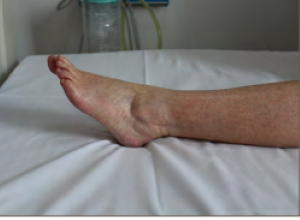
Knee bracing (static quadriceps) exercises
Lying down or slightly reclined with legs straight. Pull your ankle up and push your knee down firmly against the bed. Hold 5 seconds- relax.
Repeat 10 times.
This exercise helps you to regain control of your knee ready for standing and walking. It also helps you to achieve a straight knee.
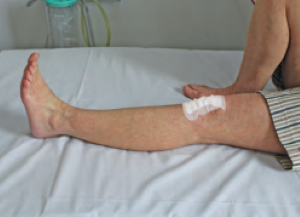
Knee bending (flexion) on a sliding sheet
Lying down or slightly reclined with a sliding sheet under your heel. Bend and straighten your knee by sliding your foot up and down the sheet.
Repeat 10 times.
This exercise will improve your knee bend which is important for getting into a car and sitting. Your hamstring muscles will become stronger.
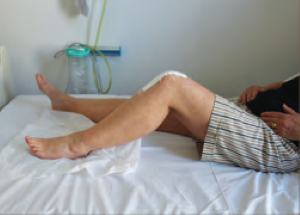
Straight leg raising
Lying down or slightly reclined. Lock your knee straight. Lift your whole leg 10cm (4 inches) off the bed. Aim to keep your leg absolutely straight. Hold for 5 seconds. Repeat 10 times.
This exercise challenges your thigh muscles and tests their ability to support you when you are standing.
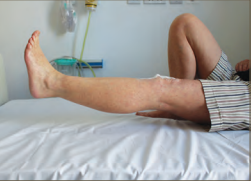
Knee stretch (posterior capsular) exercise
Lying with leg straight out in front of you, place a folded-up towel underneath your heel. Allow knee to straighten so you feel a stretch behind your knee. Hold for 30 seconds.
This exercise helps to stretch tight muscles at the back of your leg (hamstrings and calf muscles). If they are significantly preventing your knee from straightening, the Physiotherapist will advise you how often to repeat this exercise.
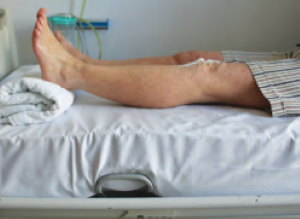
Exercises in the sitting position
By the second day after your operation, you will begin to notice improvements in your knee bend, muscle power and walking.
The flexibility and bend of your knee is best achieved as soon as possible.
You may have an increase in knee stiffness when you wake up in the morning. This is because your knee is less active at night.
You will need to work hard in the morning to achieve the same range of movements you had the previous evening. Aim to improve range throughout the day.
Your physiotherapist will advise you when to progress to the next set of exercises.
Knee bending (flexion) in sitting
Sit on a chair with your feet on the floor. Bend your knee as much as possible.
Repeat 10 times.
This exercise helps your knee to bend. Your goal is to sit comfortably in a chair with your knee at a right angle as soon as possible. A good bend will be needed in the future for stairs and getting up from a chair.
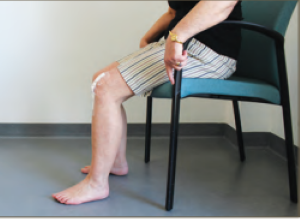
Self-assisted knee bend exercises
Sitting, cross your legs at the ankles with your good leg on top of the operated leg. Use the good leg to help bend the operated leg backwards.
Repeat 10 times.
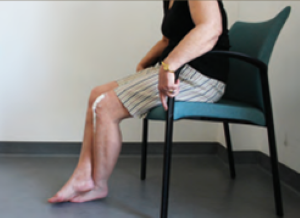
Seated lunge exercises
Sitting, bend your operated leg, back as far as you can. Keep your foot flat on the floor and do not allow it to move forwards. Slide your bottom forwards on the chair.
Repeat 10 times.
This will help to bend your knee further.
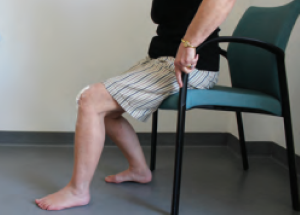
Knee bends/squats
Standing whilst holding onto a stable surface (as shown in the photo). Slowly bend your knees. Keep your heels on the floor. Slowly return to standing by straightening your knees.
Repeat 10 times.
This exercise encourages the muscles around the knee to work together in a smooth and coordinated fashion. It prepares your knee for getting up and down off low chairs and toilets.
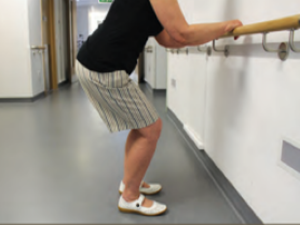
Using a walking frame
For the first day after your operation, you will probably find that you feel more confident using a walking frame especially when walking unsupervised.
Follow this order of movements:
- Move the frame forward.
- Take one small step forward with your operated leg.
- Brace the knee of the operated leg.
- Step through with your other leg whilst using the frame for support.
Tip: do not walk too close to the front of the walking frame.
Using sticks or crutches
Once you are confident with the walking frame you will progress to using sticks/crutches (whichever you and your therapist feel is most appropriate).
Advice for walking with sticks/crutches:
- Move sticks/crutches forward together.
- Step forward so the operated leg is level with the sticks/crutches.
- Place weight as necessary, through your arms onto sticks/crutches.
- Brace the thigh of the operated knee.
- Step your other leg forwards past your operated leg.
- When you feel confident enough to use only one stick/crutch, hold it in the opposite hand to your operated leg.
Walking
Following your operation, you will be encouraged to get up and walk. It is important to walk on a regular basis, and to steadily increase the distance as you recover. It is normal to put full weight through your operated leg.
As soon as possible, try and walk placing one foot past the other in a normal walking pattern. You can progress to using one crutch or a stick held on the side opposite to your operated leg as soon as you feel safe and comfortable to do so. If you are uncomfortable or if you limp when walking, continue to use your walking aids.
Stairs
The therapist will practice with you how to safely use the stairs before going home. To go up and down the stairs, use a banister rail if there is one.
Going down, put the crutch/stick on the step below then step down with the operated leg, followed by the unoperated leg.
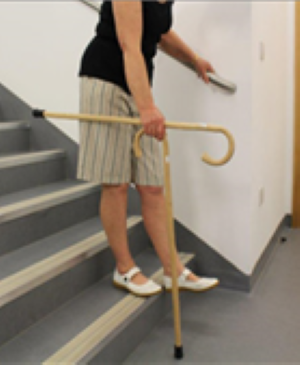
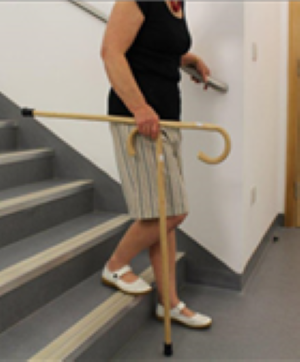
Go up leading with the unoperated leg first, followed by the operated leg and then the crutch/stick.
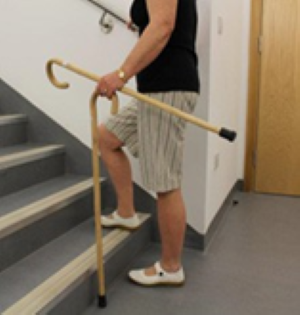
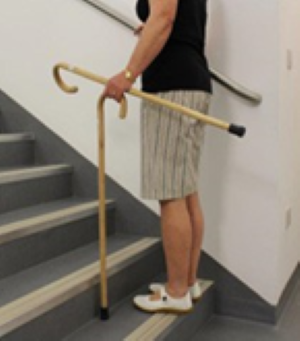
Therapy advice
Sleeping
You may sleep in any position including lying on either side. It is essential that you do not sleep with your knee bent over a pillow.
Getting dressed
We encourage you to get dressed into your own comfortable day clothes as soon as possible after your surgery rather than staying in pyjamas or a hospital gown.
Driving and car travel
You can travel as a passenger in a car immediately following your operation.
- It is best to sit in the front seat, have someone move it well back.
- If possible, get into the car directly from the drive or road rather than the kerb or pavement.
- Use your arms to lower yourself onto the edge of the car seat.
- Slide back into the seat.
- Lift both legs in as your body turns to sit in the seat.
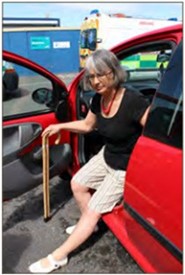

Stop regularly on longer journeys so you can get out of the car to change position and move around.
You should not drive until you are able to perform an emergency stop safely.
We recommend you inform your insurance company before you start driving.
Returning to full activities
At first you will need help with household tasks which involve carrying items or kneeling. Kneeling may be uncomfortable for the first few months. Sometimes the scar remains sensitive and not everyone finds it possible to kneel after a knee replacement.
You should be able to start your normal activities such as gardening or bowling as soon as you no longer need walking aids. This is normally 6 weeks after surgery.
You should not swim before your wound is fully healed.
Discuss your lifestyle and activities with your consultant at your clinic review at 6-12 weeks. They will be happy to advise you on returning to your normal activities.
The time of your return to work will depend on your job. Your consultant will advise you on this.
Equipment
The walking aids and any equipment prescribed to you after your surgery are provided by an equipment company. Please ring the number on the sticker on the equipment, to discuss its return.
© North Bristol NHS Trust. This edition published November 2024. Review due November 2027. NBT003722.
Support your local hospital charity

See the impact we make across our hospitals and how you can be a part of it.

